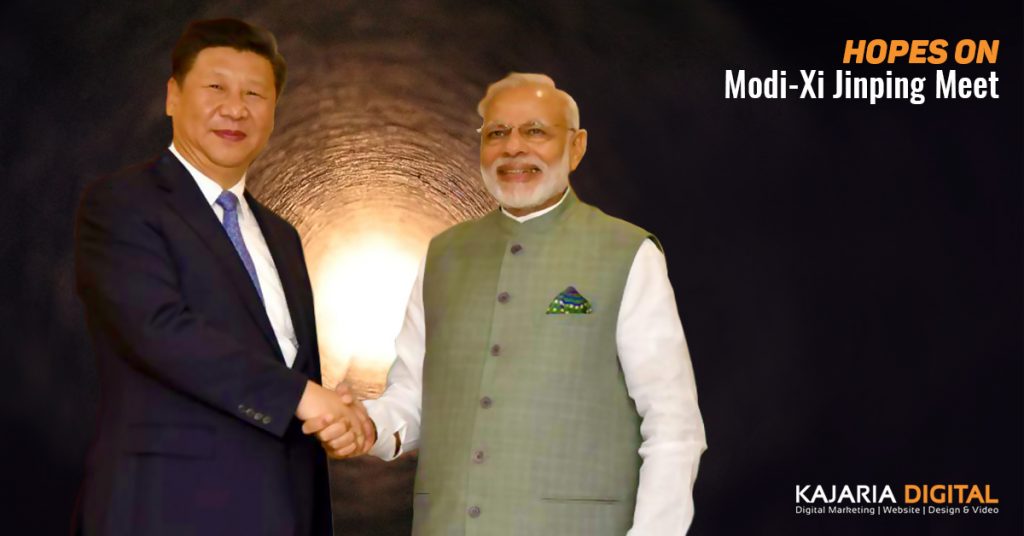Prime Minister Narendra Modi and Chinese President Xi Jinping will be sitting down for a summit in China’s charming Wuhan city from 27 to 28 April. Reports confirmed that the summit is meant for an amiable tête-à-tête to unearth new standards for India-China ties and discover ways to deal with the litigious issues like the border conflict.
Amidst the reportage concerning the forthcoming summit, talks about previous arbitrary incidents associated with India-China relationship are also doing the rounds. A quick recap of the same:
Chinese President Xi Jinping’s 2014 India visit
The visit is considered to be a milestone, as a Chinese president had visited India for the first time after the 1962 war when India-China relations plummeted. Xi became the first Chinese president since Zhou Enlai to receive a public welcome.
China had approved twelve agreements during the visit, which included cooperation in railways and outer space. Modi had also discussed civil nuclear energy collaboration while encouraging broader assistance on energy security.
China’s Reaction to Uri Attack
China’s first reaction to the 2016 Uri Attack was a comprehensive exhibition of concern. Chinese foreign ministry spokesperson Lu Kang stated that China was traumatized by the attack. The spokesperson voiced concern over the escalating tensions and frenzied situations in Kashmir. China had asked India and Pakistan to resolve their conflicts through dialogue.
The Doklam Standoff
In June 2017, an armed border confrontation took place between the Indian armed forces and the People’s Liberation Army of China. The conflict initiated after China edified a road in Doklam. Chinese armed forces came to the zone with construction vehicles and road-building apparatus.The Chinese army started expanding an existing road southward in Doklam.
Both China as well as India’s ally Bhutan have claimed the territory of Doklam. Almost 270 Indian troops went into Doklam with weapons and two bulldozers. They aimed to impede the Chinese soldiers from building the road.
The territory of Doklam has gone over a long-standing dispute between China and Bhutan. The area is situated near China and Bhutan’s tri-junction with India. Although India doesn’t claim Doklam like China and Bhutan, it supports Bhutan’s claim.
The Prolonged Standoff
The scenario worsened on last year’s Independence Day when many Indian and Chinese soldiers were allegedly injured after a skirmish commenced between them. The encounter started when Chinese soldiers had reportedly attempted to trespass close to the Pangong Lake, across the border into India regulated territory in Ladakh.
Fortunately, on August 28, 2017, India and China declared that they have mutually decided to retract their troops from the standoff in Doklam. Reports cited that the withdrawal was completed by the end of that day.
China rescues Masood Azhar
It was during November 2017, when China had used its veto powers at the UN Security Council (UNSC) to stop a proposition given by the US, France, and Britain to catalog Maulana Masood Azhar, chief of Pakistan-based Jaish-e-Mohammed (JeM) militant group, as a global terrorist. China, the veto-exercising permanent member of UNSC, had stated that it had rejected the bid as there was a lack of agreement among the UNSC members.
China has frequently rejected India’s step to assign Masood Azhar as a terrorist under the Al-Qaeda Sanctions Committee. Raveesh Kumar, the Indian foreign ministry spokesman, had cited that duplicity and discerning approaches will simply weaken the international community’s resolution to fight terrorism.
China’s Latest Reaction to India’s Thoughts on Pakistan
PM Modi had recently visited London where he gave a speech which included slamming Pakistan. During the town hall meeting, the Indian Prime Minister called Pakistan a “terror export factory.”
While the forthcoming summit pledges to talk about improving India-China ties, China took a different route on Modi’s above comment. The Chinese government noted that the global community must support Pakistan’s counter-terrorism efforts. Furthermore, foreign ministry spokesperson Hua Chunying said that the international community must build active collaboration with Pakistan in its fight against terrorism.
The Meeting Between The Foreign Ministers
Attempts have been implemented by PM Modi’s government to retune associations with Beijing after years of disparity over issues about their border, banished Tibetan spiritual leader the Dalai Lama and more. Since the last few weeks, speculations started gearing up regarding the upcoming informal summit which is now being considered to be the turning-point for India-China ties.
The speculations became fact during the meeting between Swaraj and Chinese counterpart Wang Yi. In this meeting, the Indian External Affairs Minister shared views with Yi regarding mutual aid on the multilateral arena. The two conversed about their viewpoint on counterterrorism and joint efforts to concentrate on other global affairs, like climate change and sustainable development.
The two ministers had primarily talked about safeguarding peace and equanimity in the India-China border areas. Both feel that doing so is robustly obligatory and it is a predominant determinant for the seamless improvement of bilateral ties.
China Keeps on Strengthening Ties With Pakistan
On Monday, China gave assurance to Pakistan that associations between the two nations were as compact as ever and their ties would not encounter any corrosion. The statement came after the news of the Modi-Xi Jinping summit as China realized that the upcoming summit might fluster Islamabad.
In actuality, the two nations jointly call each other – friends for all seasons. India has forever perceived this habitually close tie with suspicion. Furthermore, India has repeatedly alleged that Pakistan is sheltering and shielding terror masterminds such as Hafiz Saeed who was the architect of the 26/11 attacks in Mumbai.
The Modi-Xi Jinping Summit Looks Promising & Hopeful
It became apparent that the upcoming summit will act as a landmark in India-China relationship. Sources have confirmed that the two administrators will expend many hours sharing their idea and outlook about international and domestic situations. The two will purportedly discover plans to attend to the controversial bilateral issues.
With the emergence of the summit that may develop India-China ties, international powers such as the United States, the United Kingdom, France, and Germany will logically find a prospect of relief. Although China did provide immense assurance to its all-weather friend about retaining their close ties, Pakistan will be all red-faced if India-China ties fortify. It would certainly come to Pakistan as a global humiliation.
This article was brought to you by Kajaria Digital. Kajaria Digital is one of the best digital marketing agencies in Kolkata, which specializes in online marketing, website development, designing, animation, and making corporate videos. Kajaria Digital works with the finest pool of professionals in the field of marketing, designing, content & animation. For your business, we can create the best strategy with an engaging message to whirl your customers. Call us at +91-98300-43880, or you may just drop a mail at kajariadigital@gmail.com.

